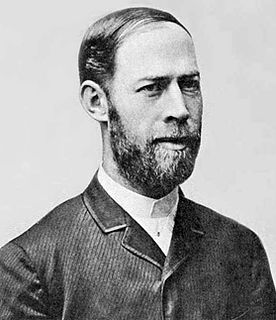A Quote by Clayton Christensen
In the first stage of insight-building, all that researchers can do is observe phenomena. Second, they classify the phenomena in a way that helps them simplify the apparent complexities of the world so they can ignore the meaningless differences and draw connections between the things that really seem to matter. Third, based on the classification system, they propose a theory. The theory is a statement of what causes what and why, and under what circumstances.
Related Quotes
The theory I propose may therefore be called a theory of the Electromagnetic Field because it has to do with the space in the neighbourhood of the electric or magnetic bodies, and it may be called a Dynamical Theory, because it assumes that in the space there is matter in motion, by which the observed electromagnetic phenomena are produced.
The phenomena in these exhausted tubes reveal to physical science a new world-a world where matter may exist in a fourth state, where the corpuscular theory of light may be true, and where light does not always move in straight lines, but where we can never enter, and with which we must be content to observe and experiment from the outside.
Many theories of the ancient world seem terribly childish today, a hodge-podge of fables and false comparisons.But our theories will seem childish five-hundred years from now.Every theory is based on some analogy, and sooner or later the theory fails because the analogy turns out to be false. A theory in its day helps to solve the problems of the day.
Catastrophe Theory is-quite likely-the first coherent attempt (since Aristotelian logic) to give a theory on analogy. When narrow-minded scientists object to Catastrophe Theory that it gives no more than analogies, or metaphors, they do not realise that they are stating the proper aim of Catastrophe Theory, which is to classify all possible types of analogous situations.
Evolution as described by Charles Darwin is an scientific theory, abundantly reconfirmed, explaining physical phenomena by physical causes. Intelligent Design is a faith-based initiative in rhetorical argument. Should we teach I.D. in America's public schools? Yes, let's do - not as science, but alongside other spiritual beliefs, such as Islam, Zoroastrianism and the Hindu Idea that Earth rests on Chukwa, the giant turtle.
It is a remarkable fact that the second law of thermodynamics has played in the history of science a fundamental role far beyond its original scope. Suffice it to mention Boltzmann's work on kinetic theory, Planck's discovery of quantum theory or Einstein's theory of spontaneous emission, which were all based on the second law of thermodynamics.



































